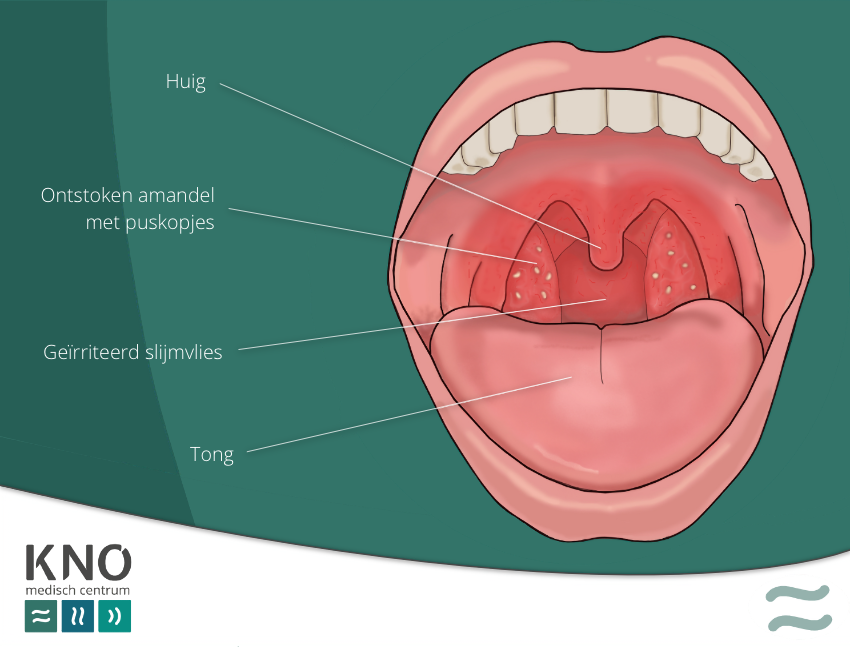what ARE INflamed tonsils?
explanation
The tonsils are some type of lymph nodes that are located in the back of the throat. Since they are somewhat irregular, bacteria or viruses can accumulate here and the tonsils can become inflamed. Often complaints consist of fever and a severe sore throat that lasts more than a week. Inflamed tonsils can swell considerably, and the lymph nodes in the neck can also be swollen. Tonsillitis can make you feel very ill.

What symptoms are associated with inflamed tonsils?
symptoms
A tonsillitis of the throat usually starts with a severe sore throat and a very red throat. Sometimes the sore throat is only present when swallowing. The tonsils can become swollen and white dots (pustules) can be seen on the tonsils.
Other complaints may also arise, such as:
- Fever
- Cough
- Mucus in the throat
- Hoarseness
- Swollen throat
- Swollen lymph nodes in the neck
- Not feeling well or being sick
Sometimes the tonsillitis spreads into the surrounding tissue where pus can build up and form an abscess in the throat (peritonsillar abscess). The mouth is very difficult to open, there is often a high fever, swallowing is difficult and there is a lot of mucus formation. If a peritonsillar abscess is suspected, someone must be referred urgently to an ENT specialist to have the abscess relieved.
what is the cause of tonsillitis?
cause
Irregular tonsils
Tonsils are some type of lymph nodes that are located in the back of the throat. Because they are somewhat irregular, bacteria or viruses can accumulate in them and can become inflamed. Sometimes the tonsils can become a source of infection, since bacteria, viruses and food particles build up recurrently in the tonsils. Then the tonsils can become inflamed several times a year.
Pfeiffer’s Disease
Pfeiffer’s disease is an infectious disease caused by the Epstein Barr virus. The virus is very contagious. The resulting complaints depend strongly on age and include fever, skin rash, laryngitis, swollen neck glands and fatigue. Most people have been infected with the virus before the age of 20, in many cases undetected.
Chronic tonsillitis
The tonsils can also become chronically inflamed. The following complaints can occur with a chronic throat infection:
- Regular episodes of mild sore throat, fatigue, moderate appetite
- bad breath (foetor ex ore) or snoring.
There can also be tonsil stones: dirty plugs consisting of food and bacteria that accumulate in the tonsils and release in the mouth over time.
Inflamed tonsils in children
Inflamed tonsils are especially common in children. In young children, the immune system is not yet fully developed. As a result, they are more likely to develop upper respiratory tract infections. In addition, they more often come into contact with a cold at the crèche or daycare.
The tonsils can also become inflamed as a result of an upper respiratory infection. The tonsils also actively contribute to the development of resistance during the first 3 years of life. After that, tonsils no longer have a special function. If an excessive number of throat infections persist (7 to 8 tonsillitis per year) after these first 3 years, it is wise to have the tonsils removed.
In addition, the tonsils can swell to such an extent that a child can have difficulty in breathing at night. This is also a reason to remove the tonsils.
If there are more than 3 to 4 tonsillitis episodes for several consecutive years, this can also be a reason to remove the tonsils.
For more information, visit: removing tonsils in children .
What to do about INflamed tonsils?
solution
A tonsillitis usually does not require treatment. The complaints often resolve within 10 days.
It is possible to relieve the pain of a throat infection:
- Drink regularly.
- Take especially cold drinks or ice cream.
- Avoid alcohol, spicy food or carbonated drinks.
- Don’t smoke.
- Sucking on a candy or licorice can relieve the symptoms of a sore throat.
- Take some rest and do not strain the voice too much.
- Take a painkiller. Preferably paracetamol.
Which medicine for tonsillitis?
medicine
Painkillers
Paracetamol is a good painkiller for tonsillitis. Healthy adults can take 1000mg 4 times a day. If the pain does not disappear sufficiently, it is wise to contact the doctor for additional pain medication.
Antibiotics
Antibiotics often do not help for tonsillitis. Antibiotics often have side effects as well. They are therefore not often prescribed. If there is a high fever and a high degree of illness, your doctor may still choose to start with a course of antibiotics. The tonsilitis itself will usually not disappear faster.
Which possible treatment HELPs for INflamed tonsils?
treatment
A tonsillitis usually does not require treatment. The symptoms often resolve within 10 days. If the tonsils in particular regularly inflame, they can become a source of infection, since bacteria, viruses and food keep on accumulating in the tonsils. If there are many complaints at the time of a tonsillitis or if medicines have to be prescribed too often, it may be wise to have the tonsils removed.
See the information about removing tonsils.
When to contact an ENT surgeon?
contact
If the sore throat does not resolves within a week, if it gets worse or if you feel very ill, it is wise to contact your GP. He or she can then assess whether it is wise to visit an ENT doctor.
If the tonsillitis returns regularly, it may also make sense to see an ENT specialist. He or she can then assess whether there is a reason to surgically remove the tonsils .
More information
Click on the links below for more information
Dutch Association for ENT Surgery
Lump in the throat
Voice problems in adults
Guideline
Diseases of adenoid and tonsils
GP
This patient information has been compiled with the utmost care. It concerns general information. This information is not legally binding. © KNO Medisch Centrum / knomc.addsoul.nl
